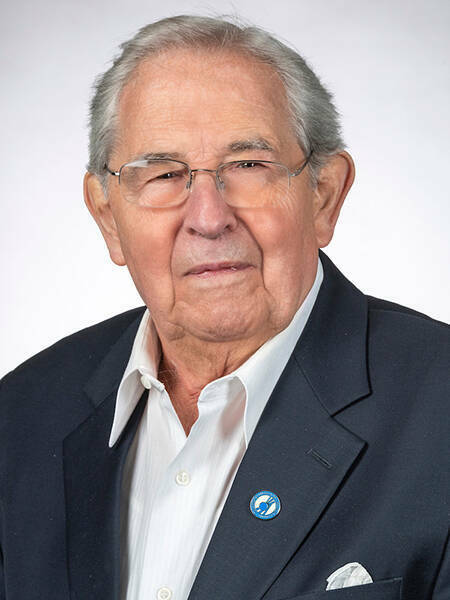In memoriam: Winfried ‘Fred’ Dallmayr, professor emeritus of political science

Winfried “Fred” Dallmayr, professor emeritus of political science at the University of Notre Dame, died June 5. He was 95.
A native of Germany, Dallmayr experienced a tumultuous childhood during World War II that impacted him greatly and shaped his trajectory as a political theorist and philosopher. His research focused on modern and contemporary European thought, with an interest in comparative or cross-cultural philosophy.
“He fervently believed that political theorists should not limit themselves to Western ideas, but they should be open to global political philosophy and theory,” said A. James McAdams, the William M. Scholl Professor of International Affairs. “He was also a proponent of the idea that morality should not be left up to the individual to determine but rather should grow out of the meaningful interactions of fellow human beings. In this sense, especially given the emphasis that he put on spirituality, Fred was a true Notre Dame intellectual.”
While a part of Notre Dame’s Department of Political Science, Dallmayr was a recipient of a National Endowment for the Humanities fellowship in 1978 and a Fulbright Research Grant in India in 1991. He retired in 2004 as the Packey J. Dee Professor of Political Science.
He authored 40 academic books, averaging a production of one book a year, many of which were translated into varying languages. He also co-wrote and edited books until he was 94.
A sampling of his recent publications include “Contemporary Chinese Political Thought: Debates and Perspectives” (2012), “Return to Nature?: An Ecological Counterhistory” (2011), “Integral Pluralism: Beyond Culture Wars” (2010), “Comparative Political Theory: An Introduction” (2010), “Civilizational Dialogue and Political Thought: Tehran Papers” (2007) and “In Search of the Good Life: A Pedagogy for Troubled Times” (2007).
“He was extraordinary in that sense, and they were high-quality books based on first-rate scholarship, and his works were recognized as such by people around the world,” said McAdams, who noted he saw Dallmayr give a book presentation only four weeks before his death. “Until the very end, he was the consummate intellectual.”
Dallmayr began his academic career in Germany and Italy. After immigrating to the United States in 1955, he received a doctorate in political science from Duke University in 1960 and taught at Purdue University until he joined the Notre Dame faculty in 1978, holding a joint appointment in the Department of Philosophy.
He also served as the president of the Society for Asian and Comparative Philosophy, an advisory member of the scientific committee of Reset Dialogues on Civilizations (Reset DOC) in Rome, the executive co-chair of World Public Forum Dialogue of Civilizations (WPF-DOC) in Vienna, and was a member of the supervisory board of the Dialogue of Civilizations Research Institute in Berlin.
Dallmayr is survived by his wife, Ilse Dallmayr; two children, Dominique and Philip; and two grandchildren, Keegan and Josefina.
Originally published by at al.nd.edu on June 12.
Latest ND NewsWire
- Alumni Association awards 2024 Lennon Life PrizesThe Notre Dame Alumni Association recognized nine alumni clubs as recipients of the Lennon Life Prize — part of the Chuck and Joan Lennon Gospel of Life Initiative, a set of programs focused on encouraging the University’s dedicated network of clubs to uphold the value of life at all stages.
- 'Hybrid’ disaster response shows how localization saves livesThe earthquake that struck southwest Haiti in August 2021 killed thousands of people and left more than half a million seeking help. New research by a University of Notre Dame expert finds that the assessment of this disaster can serve as a model for evaluating future disasters and making life-saving improvements.
- Carter Snead testifies before US Senate Judiciary CommitteeO. Carter Snead, the Charles E. Rice Professor of Law and director of the de Nicola Center for Ethics and Culture at the University of Notre Dame, offered expert testimony on Wednesday (June 12) before the U.S. Senate Committee on the Judiciary.
- Into high waves and turbulence: Engineers deploy smart devices to improve hurricane forecastsForecasters’ ability to predict a hurricane’s intensity has lagged behind tracking its path because the forces driving the storm have been difficult and dangerous to measure — until now. “When we’re talking 150, 200-mph winds, with 30-foot waves, you don’t send a boat and crew out there to collect data,” said David Richter, associate professor of civil and environmental engineering and earth sciences. Richter is the lead investigator on an Office of Naval Research grant to send drones and other “smart” instruments into hurricanes to collect needed data.
- President Emeritus Rev. John I. Jenkins, C.S.C., honored with Sorin AwardIn recognition of a lifetime of service to the University of Notre Dame, culminating in his 19-year tenure as University President, Rev. John I. Jenkins, C.S.C., was presented with the 2024 Rev. Edward Frederick Sorin, C.S.C., Award on June 1 during the …
- DeBartolo Performing Arts Center to host Juneteenth Celebration and Resource Fair Friday at Notre DameThe DeBartolo Performing Arts Center (DPAC), in partnership with the Center for Social Concerns, will host a Juneteenth Celebration and Resource Fair from 3:30 to 5 p.m. Friday (June 14) on the campus of the University of Notre Dame.













